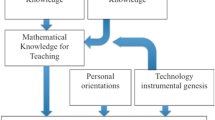Abstract
Just as Dewey argued during the industrial revolution, from the 1890s–1930s, and Martin argued in the 1960s–1990s with our “second wave” working revolution (when middle class women joined the work force in significant numbers): today’s times are out of joint, potentially dangerous conflicts exist, and teachers have some responsibility in making things right. We are in another social revolution, as work is changing significantly again, due to advances in technology. Let’s call these current changes in work the technology revolution. Again, we need to rethink our school structures, curriculum, and pedagogy. In an effort to contribute to that process, I direct our attention to the need to redefine work, and re/examine the connections between work and education in this paper.
Similar content being viewed by others
Notes
“2016 Mother’s Day Infographics: Infographics for How Much Moms are Worth this Year,” salary.com, accessed on June 1, 2017.
“Wealth Gap in America Widens to Record Level, Report Says,” Los Angeles Times, June 1, 2017, accessed on June 1, 2017. http://www.latimes.com/business/la-fi-pew-wealth-gap-20141217-story.html “If You Thought Income Inequality was Bad, Get a Load of Wealth Inequality,” by Christopher Ingraham, May 21, 2015, The Washington Post, Wonkblog, accessed on June 1, 2017. www.washingtonpost.com/news/wonk/wp/2015/05/21/the-top-10-of-americans-own-76-of-the-stuff-and-its-dragging-our-economy-down/?utm_term=.288dab7fe23a.
Martin (1985) and Okin (1979) offer excellent descriptions of ancient Greek society and they discuss the problems with Plato’s plan from the perspective of women and slaves. Their work is an excellent supplement to Plato’s The Republic, and I include them in my required readings, and the classroom discussions.
Thomas Jefferson: Writings: Autobiography/Notes on the State of Virginia/Public and Private Papers/Addresses/Letters (1984, ISBN 978-0-940450-16-5) Library of America edition.
References
Boyles, D. 1998/2000. American education and corporations: the free market goes to school. New York: Falmer.
Boyles, D. (ed.). 2008. The corporate assault on youth: Commercialism, exploitation, and the end of innocence. New York: Peter Lang.
Dewey, J. 1935. The teacher and his world. The Social Frontier 1(4): 7.
Dewey, J. 1966. Democracy and education. 2nd ed. New York: Free Press. (Original work published in 1916).
Dewey, J. 1990. The school and society [1900] and The child and the curriculum [1902]. Chicago: The University of Chicago Press.
Gutmann, A. 1987. Democratic education. Princeton: Princeton University Press.
Gutmann, A., and D. Thompson. 1996. Democracy and disagreement. Cambridge: Harvard University Press.
Hrastinski, S. 2008. Asynchronous and synchronous e-learning. Educause Quarterly 31(4): 51–55.
Illich, I. 2013. Deschooling societ.y. Kindle ed. Ebook. (Original publication, 1971).
Martin, J.R. 1985. Reclaiming a conversation. New Haven: Yale University Press.
Martin, J.R. 1992. The schoolhome. Cambridge: Harvard University Press.
Maslow, A. 1962. Toward a psychology of being. Princeton: Van Nostrand.
Montessori, M. 1912. The Montessori method. New York: Random House. (Original work published in Italian in 1909).
Mouffe, C. 2000. The democratic paradox. London: Verson.
Noddings, N. 2013. Caring. 3rd ed. Berkeley: The University of California Press. (Original work published in 1984).
Okin, S.M. 1979. Women in western political thought. Princeton: Princeton University Press.
Plato. 1979. The Republic. R. Larson (Ed & Trans). Arlington Heights: Harlan Davidson.
Rousseau, J.J. 1961. Émile (trans: Foxley, B.). London: J. M. Dent & Sons; New York: E. P. Dutton & Co. (Originally published in French in 1762).
Rovai, A.P., and H.M. Jordan. 2004. Blended learning and sense of community: a comparative analysis with traditional and fully online graduate courses. The International Review of Research in Open and Distributed Learning 5(2): 1–13.
Sidorkin, A.M. 2007. Human capital and labor of learning: a case of mistaken identity. Educational Theory 57(2): 159–170.
Sidorkin, A.M. 2009. Labor of learning: market and the next generation of educational reform. Rotterdam: Sense Publishers.
Sidorkin, A.M. 2017a. The emancipation of children. In Schools in transition, ed. P. Siljander, K. Kontio, and E. Pikkaraine, 289–303. Dordrecht: Sense Publishers.
Sidorkin, A.M. 2017b. Education for jobless society. Studies in Philosophy and Education 36(1): 7–20.
Thayer-Bacon, B.J. 2000. Transforming critical thinking: Thinking constructively. New York: Teachers College Press.
Thayer-Bacon, B.J. 2003. Relational “(e)pistemologies”, 119–122. New York: Peter Lang.
Thayer-Bacon, B.J. 2013. Democracies always in the making. Lanham: Rowman & Littlefield.
Author information
Authors and Affiliations
Corresponding author
Additional information
Publisher's Note
Springer Nature remains neutral with regard to jurisdictional claims in published maps and institutional affiliations.
Rights and permissions
About this article
Cite this article
Thayer-Bacon, B.J. Redefining Work and Education in the Technological Revolution. Stud Philos Educ 38, 581–590 (2019). https://doi.org/10.1007/s11217-019-09649-0
Published:
Issue Date:
DOI: https://doi.org/10.1007/s11217-019-09649-0



